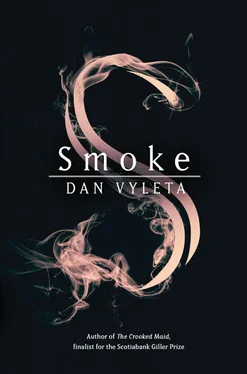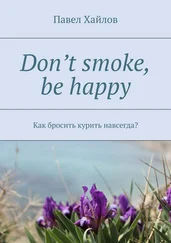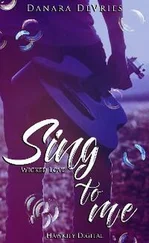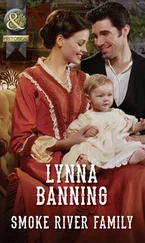However, perhaps I should be grateful for his presence. It helps me guard against complacency. Each evening I sit down after my prayers and examine my feelings. The visitors — Charlie Cooper; his presence at my father’s bedside — have enriched my life and I find myself, for once, content. But I am pleased to report that there is no joy in me when I rise in the morning to attend to my work. Joy is not a sin. But it is always better to act from duty. What one does from inclination one may do thoughtlessly. Inclination is fickle. More than that: it may lead you astray. One day, you might find yourself smoking, thinking you are doing good.
Mother says that I am obsessed; that far from dismissing Smoke, I have made it my idol. Indeed I am grateful for the Smoke. It tells us when we err. Imagine a world in which we err and nobody notices. Not even oneself. Until one goes to seed by increments and slides into the madness of villainy. Smoke eats our reason with a charcoal spoon. We measure our humanity against its darkness. It is good it leaves a mark.
On the second day of Christmas, Mother sits up late with our guests, lecturing on history. The day the Smoke came. She has sent the servants to bed. Her heresy is not for them.
Smoke, I remind her, comes from God.
So, she says, does cancer.
There is a lesson, I say, in cancer, too, and Mr. Argyle glares at me with such an intensity of anger that it makes me want to quit the room. I had forgotten his mother succumbed to that disease. Once again it is Mr. Cooper who saves the evening by suggesting a game of whist. During the game, he draws out Mother into telling stories from her time in Paris and Vienna. It is years since I have heard a laugh and, against my better judgement, I am happy.
For five whole days we are content in this manner, from Christmas Eve to the Feast of the Holy Innocents. I mark each day with a candle in the chapel. Five candles, each a foot long, wrist thick, burning at the altar of the Virgin. Then my half brother arrives. He comes on horseback, unannounced, his manservant in tow, and the next thing we know the whole house seems to be thick with him, his voice, his boisterous laughter, the chink of his spurs. He came to warn us about marauding Gypsies, he says. He brags and skulks and monopolises Mother.
I wish he had sent a letter instead.
He arrives while they are sitting at lunch. Lunch is a frugal affair of cold meat jellies and some kind of lentil porridge: a rebuke to the senses, Livia’s idea. Thomas chews each spoonful like the dreary ordeal it is, ignoring Charlie’s kicks under the table. The porridge has been thickened with cornstarch and has the consistency of frozen mud.
Then Thorpe, the butler, steps up to the table and whispers something into Lady Naylor’s ear. The emotions that attempt to gain purchase on her features are hard to read, but annoyance sits topmost, rules the slant of her mouth. She rises without a word, forcing both Charlie and Thomas to scramble to their feet (for one must not sit when a lady stands), then takes three long strides that carry her out of the room.
Curiosity easily defeats their lentil-smothered appetite. Already on his feet, Thomas follows Lady Naylor at once. Charlie is only a step behind. Livia remains at the table. Looking back, Thomas catches a glance of her: stiff-backed, chin tucked into her throat, resigned to this latest of humiliations.
They find milady in the front hall. She has taken up position at one of the big windows looking out onto the driveway. There, two riders have just climbed off their horses. The first is a tall, lumbering man in a greatcoat with close-cropped hair and hard, flat features. He is closer to fifty than forty but moves with the confident ease of a younger man. His cheeks are raw with wind and cold.
As for the second man: it is disturbing to see him out of school clothes and dressed instead in a gentleman’s hunting gear. Thick chequered tweeds in muddy greens with a matching cap and knee-high boots. A smudge of dark down twitches on the upper lip. Julius Spencer has been growing a moustache. He has brought a further horse, a pack horse, laden with trunks and leather-cased rifles. From his wrist a riding crop dangles by its loop.
They cannot hear Julius’s voice through the window. Judging by his gestures he is instructing Lady Naylor’s servants to help the older man lift down the trunks. He is his valet then. When a stable hand leaps forward to catch the reins Julius has tossed at him, a shadow darts out from behind the horse’s bulk and sits down waist-high to its master. Dark copper fur draped in abundant folds over a thickset body; the eyes red-rimmed and small within their face’s droop; the lips rolled back to disclose mottled gums of black and pink. The dog howls, a sound loud enough to carry indoors; is petted for its trouble, or rather cuffed across the head and snout, then leans its slavish love into its master.
“Milady!” Julius shouts, at the door not at the window, though he can plainly see her, see all of them, standing in a row, their eyes riveted to his figure. “Mother! Come greet your beloved son.”
At the word, Thomas turns away in disbelief.
“Surely—”
Lady Naylor’s face is stony.
“Indeed. My son from my first marriage. And you are my second husband’s sister’s child. I tried to work it out the other day. The correct terminus . Some manner of cousin, I suppose. In a roundabout way.”
She eyes Thomas blandly, then walks over to the door. “I see he omitted to mention it to you at school. An oversight, no doubt.”
She pauses before opening the door. “Well, unless you are dying to greet your schoolmate, I suggest you and Charlie return to your luncheon. I expect my little Jules will want to talk in private. He and I have business to discuss.”
ф
For the next few days they see little of Lady Naylor. She spends hours locked in with her son, then withdraws to her private quarters for all but meal-times, where she presides with grim politeness over a table split in half between her children and her guests.
Thomas expects to feel annoyed by her change: shut out, rejected, replaced; more than half his questions still unanswered. Instead, something else sets in, a newfound sense of freedom. For the first time since the day of their arrival, he and Charlie find themselves thrown together, with time on their hands. That, and Julius’s presence — his smug malice; his strutting grandiosity — makes it feel like a weekend at school.
More familiar now with the routines of the household, no longer worried about causing offence by poking their heads where they don’t belong, they go tearing through the estate. Initially, the explorations dispense with talk. It is a relief to Thomas. There has been so much talk since their arrival, so little time for the words to settle.
Their exploration unearths a whole series of wonders. The stables, for one thing, turn out to be a whole system of sheds, workshops, kennels, and living quarters, so extensive they feel like a roofed and rambling village all their own. Amongst the three dozen or so hunting dogs there is a Russian borzoi with a chest so deep, its fur almost brushes the ground. Farther back the body tapers into a waist so narrow, a child could encircle it with its hands. In another shed, uncaged, unchained, Lord Naylor’s mastiff whiles away its days, sleeping with both paws draped over an axe handle he has claimed, they are told, from earliest puppyhood. The dog is said to weigh one hundred and twenty-three pounds, and is kept on largely because “it’s bloody hard to shift.”
In the house itself they find bedchambers and drawing rooms that have not been used for generations, their floors made monochrome by inch-deep dust. The furniture is wrapped in sheets and blankets. In some rooms it is stacked, ceiling-high, and trussed up with ropes. It gives an odd bulk to sofas, chairs, and tables, turns them into mist-moored ships: a sea of dust tranquil beneath their prows. The boys’ feet upset this peace. Leaping backwards and forwards, hopping on one foot, they write demonic dances into the rooms’ memories, for servants to puzzle over in years to come.
Читать дальше












